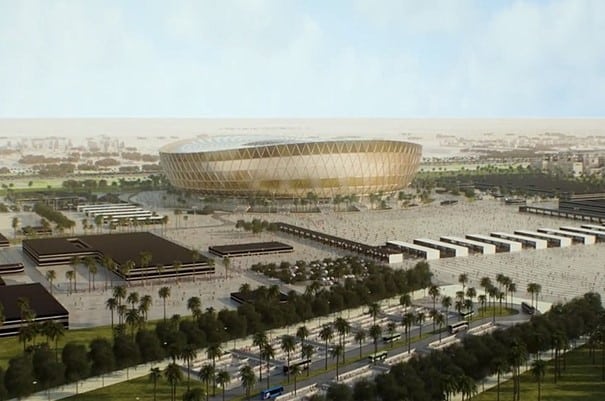View of Lusail stadium, one of the stages of the 2022 World Cup
On the eve of the 2022 World Cup in Qatar, tempers are running high. The choice of Qatar as host country is the target of mounting criticism, partly because of the degrading working conditions in which migrant workers built the World Cup stadiums. FMS spoke to Labour Party MEP Lara Wolters, who campaigns for decent working conditions worldwide. We asked her for her opinion on FIFA's choice of Qatar and the role of the Dutch government and the KNVB.
To begin with, why are you actively speaking out on this issue out?
Of course, I have that piece in The Guardian read about the 6,500 migrant workers killed. It doesn't get more cynical than that. These are some kind of medieval states of slaves enabling entertainment. I hit on that.
The reason I started digging deeper is because there are intersections with what I do myself. I am now working on a major European law on corporate responsibility. This law should ensure that European companies behave decently, even when doing business outside Europe. Until that law is in place, you will get situations like in Qatar.
'What's in FIFA's PR brochures is very different from what happens in practice'
Another pointer for me is that FIFA says it is The UN Guiding Principles On Business and Human Rights endorses - an international agreement that says countries must protect human rights and companies must respect them. They even asked John Ruggie - pretty much the godfather of corporate responsibility - to: 'write an opinion on how we can comply with those UN standards.'
In practice, on the other hand, very little happens with it. Then you see, for example, that the club football World Cup is given to China and that the next World Cup might go to Saudi Arabia. What is written in FIFA's PR brochures is very different from what happens in practice. I blame them terribly for that. FIFA is a kind of mega-company, with billions involved. You could also use those to bring about positive change. That is a missed opportunity.
'A little less bad can still be very bad'
We had the Qatari employment minister, Ali Bin Samikh Al-Marri, in the European Parliament last week and he says - as do a lot of my colleagues in Parliament -: 'Qatar has made tremendous progress.' That gives me a pointed head. A lot has changed on paper, but in practice it often hasn't. When you start from a situation that the UN has described as structural discrimination against migrant workers, you can make great strides, but you still don't end up at the level we find acceptable. A little less bad can still be very bad.
How should the Dutch government act on this issue? We also have an interest in gas supplies from Qatar.
I think it is important to be honest. We have put ourselves in a very awkward situation because we have been too naive about our dependence on Russian gas. We are now paying the price for that. There are other countries with gas reserves, such as Qatar, but they don't deserve the beauty prize either. Then you have to ask yourself: Which one is the least bad? Is there no other solution? I don't know if Qatar comes out of that. If you do come out of that, I think you still shouldn't send the king or Rutte. Qatar may well say it is scandalised, but we are talking about contracts worth millions. I wonder if their pride is worth more to them than those millions.
Furthermore, I don't think you bring about change in Qatar at the very last minute from the skybox. Nor by sending the prime minister at the very last minute, who is crammed into all kinds of pictures and has to shake all kinds of hands. Áf you want to do that, you have to do it well in advance, in a serious way.
You have also been critical of the KNVB. What do you think is their responsibility?
I had a bit of a row with the KNVB because they didn't quite understand me. The KNVB is not to blame for Qatar becoming the host country due to corruption, so they did not feel responsible for compensation. That's where the misunderstanding between me and the KNVB begins. A basic principle in responsible business is that you should always do what you can. Even when you face an unpleasant situation through no fault of your own or your own.
The example I give is that you don't have to pay a fine when you see someone being beaten up, but you call 112. The KNVB is not at fault, but that doesn't mean they don't have to do anything.
'To your credit, do what you can'
I was not convinced a few months ago that the KNVB had done everything in their power. I said to the KNVB: You are not to blame, but it would be very nice if you still contributed to a compensation fund. Not as an admission of guilt, but as a sign of respect towards the victims. Now the KNVB, together with the footballers, will auction shirts to compensate the victims. The amount of money they raise by doing so may not be that much, but you send a signal to politics and FIFA. It is an important form of political agenda-setting. I think that's a nice gesture. It's to your credit to do what you can.
Image: Wikimedia Commons





